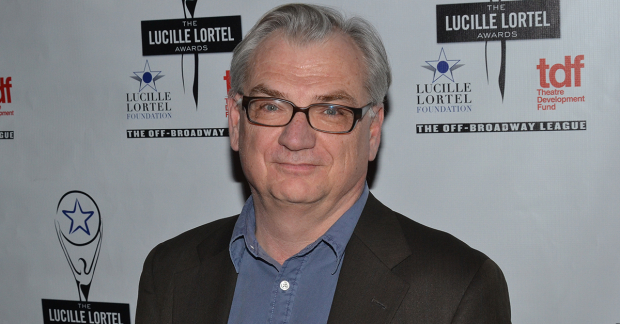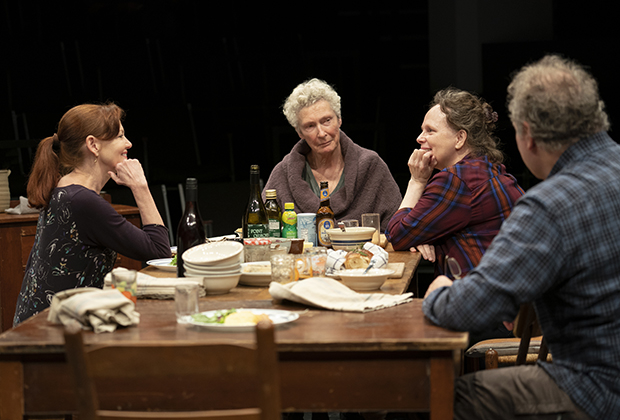Interview: 13 Plays Later, Richard Nelson Reflects on His Rhinebeck Panorama
Nelson is opening the last play in his sprawling cycle, ‘What Happened?: The Michaels Abroad”.
For just over a decade, playwright Richard Nelson has been responding to world events through the prism of different families from Rhinebeck, New York. It began with the Apple Family Plays, a quartet of dramas set in Obama-era America, and was followed by the Gabriels cycle, a trio of works set during the during the 2016 presidential election. A planned conclusion, introducing a family of artists named the Michaels, debuted in 2019 and that ending was quickly derailed by not just the pandemic, but three more Apple plays that Nelson created on Zoom to cover the recent tragic events.
Now, Nelson is gearing up to properly finish his Rhinebeck Panorama with the one play that isn't actually set there. What Happened?: The Michaels Abroad will premiere via the Hunter Theatre Project, August 28-October 8, opening on the day the play is set, September 8. Here, the ever-ambitious Nelson tells us about the new play while reflecting on what he's learned.

(© David Gordon)
Over the course of the Rhinebeck Panorama cycle, I feel like there have been a lot of presumed "last plays," and then the series grows more expansive. Is The Michaels Abroad really the last last one?
Yes. That has been the talk for a long time. When I was halfway through it all, I thought that if I could do it over 10 years, it would be perfect. So I set up The Michaels as the last group, and then I added a few last summer on Zoom, which I hadn't intended to do. This is the one play of all of them that doesn't take place in Rhinebeck.
How much of this play was set in your mind from the get-go and how much was affected by the pandemic and the events of the last year?
It's interesting. I had the play done in January 2020. I had done a number of drafts, but it was basically ready. We scheduled a reading of the finished play when the pandemic hit. When I went back to it, which I didn't do for a year, I looked at the play and saw that in the storyline, there's a great element of loss. But there was an opportunity to deepen the play a great deal. So basically, I started again. I completely rewrote the play.
You're doing this production with Hunter Theater Project and as part of your own venture called An Independent Theater. Tell me about it.
An Independent Theater evolved from the last two Zoom plays I did last summer, when, for scheduling reasons, the Public couldn't do them. I reached out to Susie Sainsbury, who has been very supportive of my work in the past, and she said go for it. I sort of produced those last two, but they were paid for by Susie Sainsbury. That gave me the idea, and I found it pretty interesting to just bring together a group of artists and put on a play like that. At 70 years old, that suddenly had an appeal, and we did it by the seat of our pants and enjoyed it. When this happened, and the need to open my show — which, like all the others, will open to the press on the day that it's set, September 8 — meant that I had to do it myself. Then I reached out to Gregory Mosher, who I know for 40-something years, and Hunter, because they did my Uncle Vanya. He was excited about it. It's just us. It's not a lot of people involved. It's very bare bones, and 74 seats.

(© Joan Marcus)
What did you learn from doing the plays on Zoom last summer?
I loved that it was really back to basics. It was the actors and me and the technician and production manager. And working with the same people was so important. I did two days of pre-rehearsals for this on Zoom with the whole company and I was talking about how there's not a person onstage who I haven't worked with before. With Jay O. Sanders and Maryann Plunkett, this is the 16th time I've worked with them. I've worked with Susan Hilferty, she claims, on something like 40 shows. And Jennifer Tipton and I go back to the late 1970s. And on and on and on.
You learn to just pick up the phone and call people and say, "I'm thinking of writing about this time were in as a Zoom play, would you be interested?" and without a second of hesitation, they were on board. That's thrilling. I also learned, when I was doing the very first Apple Family play, I remember passing Oskar Eustis in the lobby and saying I realized that if something were to happen that we as theater artists wanted to respond to quickly, I think I've got the form now. At the time, I was thinking of maybe another 9/11 kind of thing, but I remembered that conversation last summer. You feel like you can matter at a time when were certainly being pressed to feel like you don't have any work.
What is it like to be back in the room, in person? Are you nervous? Excited? Scared that someone will get sick?
We just go forward. I'm at the theater right now. I just spent five days in dance rehearsals, the first rehearsals I've been to in almost two years, and I can't tell you the joy of just watching my dancers work. It's absolutely some kind of release. We'll play it by ear. If someone gets sick, we'll regroup and figure it out, but hopefully that won't happen. We're doing our best to go forward, because the alternative — yes there's a risk — but the alternative is to do nothing, and I have to try.







